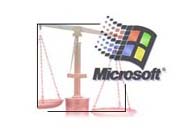|
It ain't over 'til ...
|
 |
December 19, 2001: 6:35 a.m. ET
Microsoft's antitrust case took some major turns but is likely to drag on.
By Staff Writer Richard Richtmyer
|
NEW YORK (CNN/Money) - Microsoft's ongoing legal odyssey took some major turns in 2001 as its landmark antitrust case continued to wend its way through the courts.
And while the cloud of a potential breakup of the company may have lifted, and it may have settled the matter with the U.S. Justice Department and at least some of the states who first sued Microsoft four years ago, the case and the controversy surrounding it are likely to linger into 2002 and beyond.
"The monster is not dead yet," said Bob Lande, director of the American Antitrust Institute and a professor at the University of Baltimore's School of Law.
In cooperation with 19 states, the U.S. Justice Department, under the Clinton administration, brought the case against Microsoft in 1997, claiming the company used its dominant position in the market for computer operating systems to crush competition in other segments of the software industry.
In 2000, a federal district court judge ruled that Microsoft illegally protected its operating system monopoly and ordered the company broken up as a remedy for future violations.
After a lengthy process, a federal appeals court last summer upheld the ruling that Microsoft had broken antitrust laws, but it overturned the breakup order.
| |

|
|
Click here for CNN/ Money.com's special report: Microsoft on trial | |
After the appeals court returned the case to the lower court and ordered it to come up with an alternative remedy, a different judge forced the Justice Department and Microsoft to work out a settlement, which they did last month.
But some of the states that had joined the Justice Department in filing the original suit against Microsoft have refused to go along with the proposed settlement, saying it doesn't do enough to protect consumers and level the competitive playing field in the software industry.
The holdout states earlier this month submitted an alternative plan, which Microsoft has characterized as unfairly punitive and said would result, among other things, "in wholesale confiscation" of its intellectual property and "unprecedented governmental regulation" of its product decisions.
If those states continue to press for their proposed remedy, further court proceedings would surely follow. And the judge currently presiding over the case, Colleen Kollar-Kotelly, would probably not hand down a final decision until sometime next summer, Lande said.
"And if she orders a tough remedy, as I hope she would, Microsoft will surely appeal it," a process that could carry on well beyond 2002, Lande said.
Further complicating matters for Microsoft on the legal front are a number of follow-on civil cases - some of which already have been settled - and, perhaps more important, a separate case looming in Europe.
Last August, European regulators expanded their probe of the company's business practices to see whether it is intentionally obstructing the ability of competing software for low-end servers to operate in conjunction with Windows. They also have suggested that Microsoft is acting illegally by incorporating digital streaming media technology into its Windows operating systems.
Those are likely to be thorny issues, and ones that could drag on long after the U.S. antitrust case is finally put to rest, according to Spencer Waller, director of the Institute for Consumer Antitrust Studies at Loyola Law School.
"The case is winding down in the U.S., but it's winding up in Europe," Waller said.
The European Commission, the competition watchdog of the European Union, said recently it expects to make a decision on how it plans to proceed with that case early next year.
"Right now, the EC commission is more aggressive than either the Clinton administration or the Bush administration when it comes to antitrust issues," Waller said.
While the EC does not have the power to order a breakup of the company, it could nonetheless impose a harsh remedy should it find Microsoft guilty of violating European antitrust laws.
In addition to stiff fines - which by law could amount to as much as 10 percent of the company's total revenue - the commission could order Microsoft to remove some features from Windows and even force it to reveal the underlying source code of Windows to regulatory scrutiny, Waller said.
European regulators also recently have expressed some concerns about Microsoft's newest operating system, called Windows XP, which integrates a range of new features such as Internet messaging and digital imaging.
Case has prompted small changes
Throughout the case, prosecutors have argued that, by tying other features such as Web browsing and streaming digital media to its Windows operating systems, Microsoft used its monopoly to eliminate competing software products that perform the same functions.
They also argued that Microsoft has used its market dominance to bully other industry participants, such as PC makers who they say have been subject to unfair requirements by the company on the way they configure the operating system software installed on new systems.
In its ruling, the appeals court upheld the notion that some of Microsoft's licensing practices were illegal.
In response to the appeals court ruling and as part of an effort to settle the case, Microsoft in July made a major shift in the way it licenses Windows to PC makers, allowing them more flexibility in customizing and configuring the desktop.
Although the company's rivals downplayed the significance of that move, some industry observers have pointed out that it has resulted in some changes, albeit relatively minor ones.
"There are some little bits falling off the edge, small things, that may ultimately have an influence on the industry," said Martin Reynolds, an analyst at Gartner Dataquest.
"But a lot depends on how the case finally sorts itself out," Reynolds added.
Reynolds pointed to Compaq's recent decision to start shipping all its new consumer desktop PCs with digital media software from RealNetworks pre-installed and configure those systems to use that software as the default player for audio CDs, MP3 music files and other digital media formats.
Before Compaq made that decision - which Reynolds said would not have been possible absent the antitrust issue and Microsoft's response to it - all versions of Windows used Microsoft's Media Player as the default program for playing digital media.
"In the long term, we're going to need media players on our PCs. It's going to be part of the standard digital content. And this just makes it a fraction harder for it all to be Microsoft," Reynolds said.
Still, Reynolds believes the kinds of sweeping changes some of Microsoft's foes have been lobbying for are unlikely to materialize, and those changes that do come about as a result of a final settlement will be largely invisible to the end users.
"Things aren't going to change very much from the consumer's point of view as a result of all this," he said. 
|
|
|
|
|
|

|

